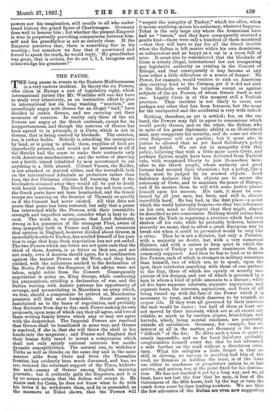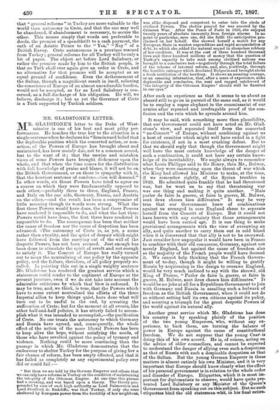THE PAUSE. T HE long pause in events in the Eastern
Mediterranean is a very curious incident. In theory the six Powers, who claim in Europe a sort of legislative right, which international jurists like Mr. Westlake will one day have to study very attentively, as an instinctive effort to give to international law its long wanting "sanction," are exceedingly angry with Greece for an illegal "raid," have decided to coerce Greece, and are carrying out their measures of coercion. In reality only three of the six Powers are angry at the Greek outbreak, except for its inopportuneness, and though the coercion of Greece has been agreed to in principle, it is Crete, which is not in Greece, that is being coerced by blockade. The coercion, too, is rather feeble. Nobody is attacking the insurgents by land, or is going to attack them, supplies of food are imperfectly arrested, and. would not be arrested at all if the Greeks had the sense to make their contracts only with American merchantmen; and the notion of starving out a fertile island inhabited by men accustomed to eat anything is a little absurd. Colonel Vassos, the Raider, is not attacked or starved either, and the townsfolk look on the international Admirals as protectors rather than foes, the few Christian citizens left knowing that if the blockaders steamed away they would all be put to death with horrid tortures. The Greek fleet has not been sunk, the Greek ports have not been bombarded, and the Greek troops are massing on the frontier of Thessaly as quietly as if the Concert had never existed. All that does not prove that peace has been restored, but only that a pause has intervened while the Powers, with their irresistible strength and imperfect union, consider what is best to do next. The truth is, we suppose, that Lord Salisbury, strong in his possession of the strongest Fleet, aware of deep sympathy both in France and Italy, and conscious that opinion in England, however divided about Greece, is immutably hostile to Turkey, has availed himself of his posi- tion to urge that hope from negotiation has not yet ended. The two Powers which are bitter are not quite sure that the third of them, Austria, is as bitter as they are, and are not ready, even if Austria should agree, for a combination against the lenient Powers of the West, and they have yielded, with the sullenness marked in the declaration of the Berlin Post that the Emperor, if his advice were not taken, might retire from the Concert. Consequently negotiation is going on, King George, while continuing his preparations, avoiding a declaration of war, and the Sultan waiting with Asiatic patience his opportunity of revenge, and accumulating in Macedonia an army which, we fear, should a compromise be arrived at, Macedonian peasants will find most formidable. Great secrecy is maintained as to the bases of negotiation, and probably they fluctuate from day to day, each Power making its own proposals, upon none of which can they all agree, and two of them writing family letters which may or may not agree with the despatches. The Imperial Powers are resolved that Greece shall be humiliated in some way, and Greece is resolved, if she is, that she will throw the shell in her hands into the magazine ; and France and England find their brains fully taxed to invent a compromise which shall not only satisfy national interests but soothe dynastic susceptibilities. The natural one, to withdraw Turks as well as Greeks on the same day and in the same manner alike from Crete and from the Thessalian frontier, has evidently been much discussed, and has, we see, received the reluctant support of the Times, hitherto the arch - enemy of Greece among English morning journals ; but it evidently galls the Emperors, and it is by no means certain that the Sultan will accept it. He wants cash for Crete, he does not know what to do with his levies if he withdraws them, and he is persuaded, as the massacre at Tokat shows, that the Powers will " respect the integrity of Turkey," which too often, when it means anything, means his autocracy, whatever happens. Tokat is the only large city where the Armenians have had no "lesson," and they have consequently received a gentle hint—there were only a hundred of them murdered —that they will have to pay for all the Greek trouble when the Sultan is left master within his own dominions, as independent and as happy as a cat in a room full of mice. It must also be remembered that the blockade of Crete is utterly illegal, international law not recognising any legislative authority as existing in the Concert of Europe, and that consequently it may become at any hour either a little ridiculous or a source of danger. No Power, for example, would venture to sink an American ship carrying food to the Cretans, yet if it did not sink it the blockade would be valueless except as against subjects of the six Powers, of whom Greece itself is not one. Legally Crete is at this moment still a Turkish province. That incident is not likely to occur, nor perhaps any other that has been foreseen, but the scope for the unexpected and the accidental is very wide indeed.
Nothing, therefore, as yet is settled; for, on the one hand, the Powers may fail to agree to concessions which would pacify Greece, and on the other, the Sultan, who in spite of his great diplomatic ability is an ill-informed man, may exaggerate his security, and do some act which even Emperors will not pardon ; but it must also in justice be allowed that as yet Lord Salisbury's policy has not failed. We are not in sympathy with that policy, believing that with a little more nerve Crete, and perhaps Epirus, might have been delivered from Turkish rule, with recognised liberty to join themselves here- after to the Greek people, whose audacity and good fortune had secured their liberation ; but a policy, like a book, must be judged by its avowed objects. Lord Salisbury declares that his objects are to secure the autonomy of Crete, and to maintain the peace of Europe, and if he secures them he will with some justice plume himself upon his success. His task, it must be con- fessed by all just men, has been, and still is, almost incredibly hard. He has had, in the first place—a point which the world habitually forgets—to obey two influences on his own mind so divergent that they might almost be described as two consciences. Nothing would induce him to assist the Turk in regaining a province which had once shaken off his rule, while he probably believes, believes sincerely we mean, that to allow a great European war to break out when it could be prevented would be very like a crime. Then he is not a dictator, but only a Premier, with a majority no doubt, but with a very numerous Cabinet, and with a nation to keep quiet in which the abhorrence of Turkey is much more unanimous than is commonly supposed. And then he has to lead or to drive five Powers, each of which is stronger in military resources than himself, two of which are, so to speak, upon the spot, their territories marching with those of one partner to the fray, three of which are openly or secretly sus- picious of his designs, and one of which is governed by a man in whom a kind of pride amounts to a disease ; while all five have separate interests, separate aspirations, and separate fears, the interests, aspirations, and fears of all being bound up with the fate of the Power which it is necessary to treat, and which deserves to be treated, as carpus vile. If they were all governed by their interests the task would be easier ; but half of them at least are not moved by their interests, which are at all events cal- culable, so much as by vanities, piques, friendships, and hatreds, which, being mental emotions, are practically outside all calculation. Germany, for example, has no interest at all in the matter, yet Germany is the most " difficult " of the five. To drive such a team in quiet is nearly impossible, and so far Lord Salisbury probably congratulates himself every day that he has advanced a mile further on the road without a disastrous over- turn. What his eulogists a little forget is that no skill in driving, no success in avoiding bad bits of the road, no firmness in holding the team, is of the least use either to coachman or proprietors unless he at last arrives, and arrives, too, at the point fixed for his destina- tion. He has not reached it yet by a long way, and we, at least, have not lost the fear that he may, in fear of the viciousness of the fifth horse, halt by the waLor turn the coach down some by-lane leading nowhere. We see that the few advocates of the Sultan are even now suggesting -that "general reforms " in Turkey are more valuable to the world than autonomy in Crete, and that the one may well be abandoned, if abandonment is necessary, to secure the other. This means simply that words are preferable to deeds, the promise of a spendthrift to a cash payment, the -oath of an Asiatic Prince to the " Yea," "Nay" of a British Envoy. Crete autonomous is a province rescued from Turkey ; general reforms for all Turkey will be only a bit of paper. The object set before Lord Salisbury, or rather the promise made by him to the British people, is that no Turk shall ever again give an order in Crete, and no alternative for that promise will be accepted as an -equal ground of confidence. Even the dethronement of the Sultan, though a magnificent result in itself, relieving the conscience of Europe of an almost unendurable burden, would not be accepted, as far as Lord Salisbury is con- cerned, as a full discharge of his obligation. He will, we believe, discharge it ; but as yet the Governor of Crete is a Turk supported by Turkish soldiers.







































 Previous page
Previous page